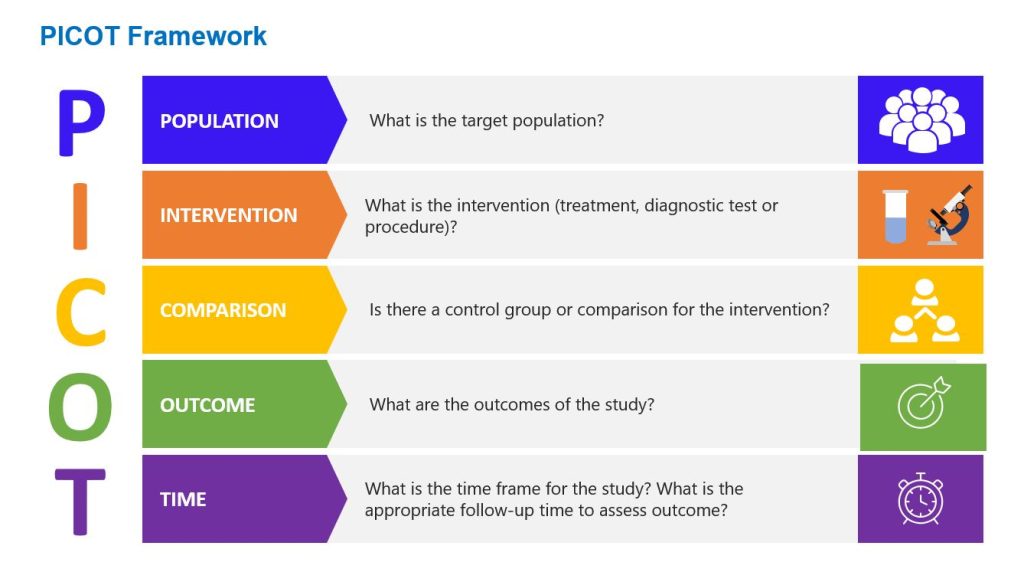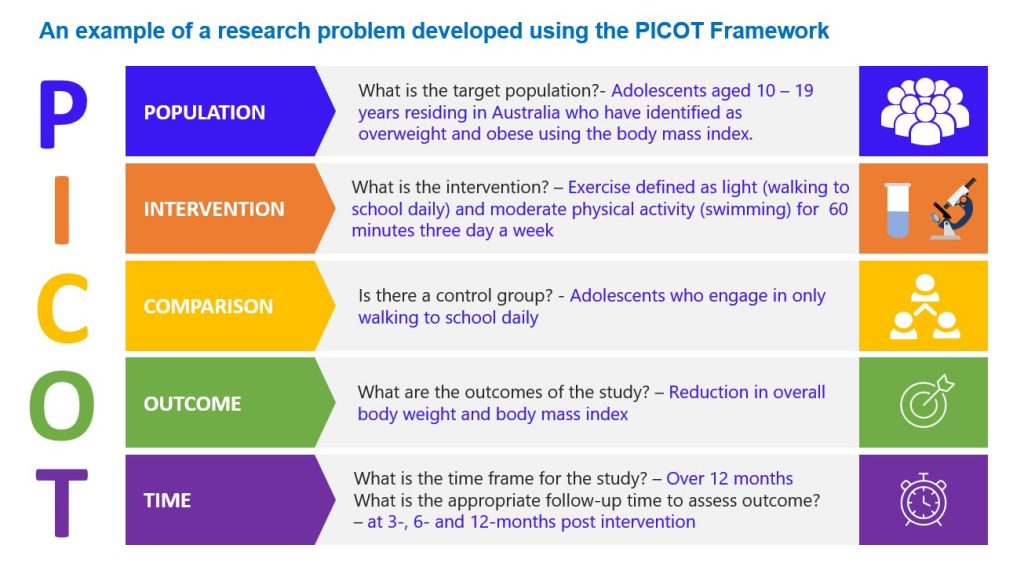2.4 Developing a Research Question
Once the research topic has been decided, the next step is to formulate the research question(s) (Figure 2.1). The research question highlights the issue that has to be investigated and directs the methodology. It also results in the development of a testable and appropriate hypothesis. It is thought that high-quality research results from well-crafted research questions.9 Coming up with good research questions is something that most novice researchers find challenging. A valid tool that is useful in formulating a good research question is the PICOT framework which is commonly used in quantitative research.6 To use this framework, you need to consider the population of interest (P), the intervention (I) under investigation, the control or comparison group (C), the outcome (O), and the time frame (T) during which the study will take place (see Figure 2.5).6

In addition, the framework is valuable when developing and stating a research hypothesis driven by the research question.6 A hypothesis is a foundation and logical construct between a research problem and its solution, and it expresses a possible answer to a research question.10 The research question serves as the basis for the development of the research hypothesis, which is then summarised in a way that establishes the basis for testing, statistical analysis, and, ultimately, the significance of the study (30). A good hypothesis is usually founded on a good research question. There are two types of research hypotheses – conceptual research hypothesis and operational research hypothesis.10 The conceptual research hypothesis is a broad or general statement about a research problem, while the operational hypothesis is a more specific statement that provides a detailed description of how the variables in the study will be measured, and predicts how they will be related to one another.10 Thus, the operational hypothesis is a testable statement that is derived from the conceptual hypothesis. The example below in Figure 2.6 and Box 2.1 shows how the PICOT framework is used to develop a research question and hypotheses.

| Research Question |
| Is frequent and regular exercise associated with a decrease in body weight and body mass index among overweight and obese Australian adolescents? |
| Conceptual Hypothesis |
| Frequent and regular exercise reduces obesity in Australian adolescents |
| Operational Hypothesis |
| Frequent and regular exercise, defined as light exercise ( walking to school daily) and moderate exercise (swimming for 60 minutes three days a week), will reduce overall body weight measured in kilograms and body mass index in overweight and obese Australian adolescents aged 10 to 19 years compared to only light exercise (walking to school) only. |
Characteristics of a good research question
A good research question has the following qualities: it is Feasible, Interesting, Novel, Ethical, and Relevant (FINER).11
Feasible: being feasible indicates that it is practical for the investigator to carry out.11 This refers to the distribution of appropriate resources (including a budget), sufficient research design, readily available skills and information, and an acceptable time limit.12 Participants must be realistically recruitable and accurately representative of the relevant population if they are to be chosen for the study.12 The research question should be connected to the available observations, phenomena, indicators, or variables.13
Interesting: the presentation of the research questions and the story that may be told about the research field through investigation and analysis are two important aspects of what makes research intriguing.12 It is also a good idea to check if the research question is intriguing to others.11 If research does not address a question of interest, it will have no influence or impact.11 While a research study may be interesting, other contextual factors, such as the way the issue is presented, the context of the subject, the target audience, and the reader’s expectations, may impact whether the findings will be considered intriguing or not.14
Novel: novelty and relevance are the most important criteria for any research project’s success.12 Good research adds fresh knowledge.11 A study that essentially restates what has already been proven is not worth the time, money, and effort and is not likely to be published.11 Novelty can range in breadth from moderately unique to extremely novel, and it may involve, among other things, contesting preexisting theories, positing new ones, or both.12 Novelty also has to do with pointing out specific gaps in the field’s current ideas or methods for looking at phenomena or with the extension of theories or results to new subfields.12 By carefully reading the literature and consulting with specialists who are familiar with ongoing unpublished research, one can assess the uniqueness of a proposed study.11
Ethical: research must be ethical; thus, research questions must not result in unethical conduct.11 The research should be conducted in a way that reduces the risk of harm to participants, protects their privacy and confidentiality, and gives them the option to withdraw from the study.12 It is important to obtain approval from the institutional review board before beginning research.11 Further details on ethical considerations are presented in chapter 6.
Relevant: relevant topics are those that are of priority at a given time in the research community and have an impact on upcoming research directions.12 Relevant questions have a clear target audience in the community, and the answers to their inquiries have an impact on ongoing research projects.12 Thus, it is crucial to consider the potential outcomes and how each one might increase scientific understanding, impact clinical recommendations and public health policies, or serve as a direction for future study.11
Use the Padlet below to develop a research question of interest to you.
- Think of a research topic that you are passionate about.
- Do you know if this problem has been researched before? If yes, what are the gaps?
- Articulate on paper a research gap/problem (from this topic) that you would like to investigate.
- Phrase the problem as a research question and post it on the Padlet below.
Reflections: Is your research question feasible, interesting, novel, ethical and relevant?

